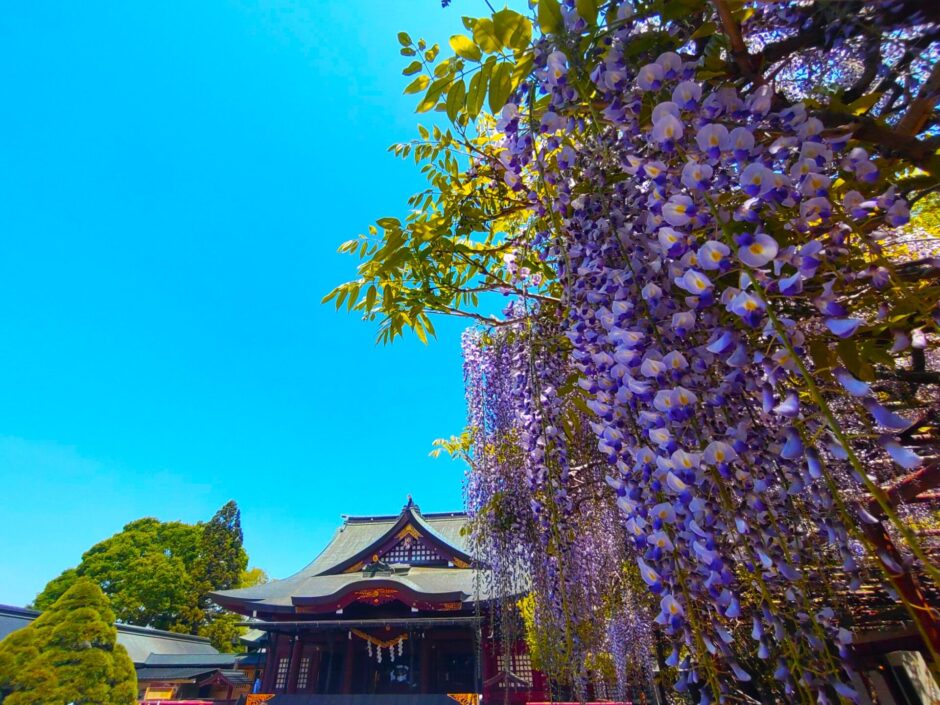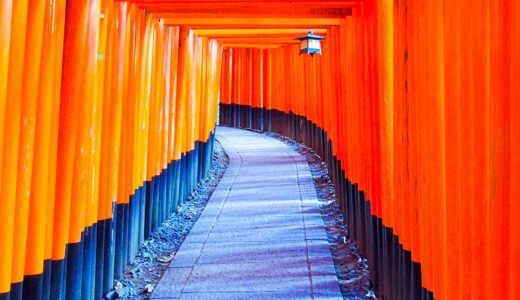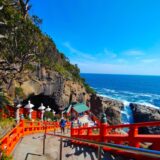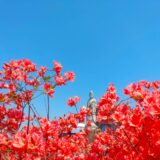目次
- 【Kasama Inari Shrine summary】
- 【Kasama Inari Shrine large torii】
- 【Kasama Inari Shrine shopping street in the precincts of a shrine (temple)】
- 【Kasama Inari Shrine tower gate】
- 【Kasama Inari Shrine Double-petaled wisteria】
- 【Kasama Inari Shrine sacred tree】
- 【Kasama Inari Shrine Main shrine】
- 【Kasama Inari Shrine boulder formed from gravel and sediment】
- 【Kasama Inari Shrine Memory of the construction work for the preservation of the main hall GOSHUIN】
- 【Kasama Inari Shrine Nearby attractions】
- 【Kasama Inari Shrine Access】
- Manager’s Comments
- Kasama Inari Shrine
【Kasama Inari Shrine summary】
Kasama Inari Shrine was built in 651 (Shiraki 2). In 1743, during the reign of Emperor Sakuracho, the shrine was expanded by Masatoshi Inoue, then lord of Kasama Castle, and in 1747, Sadamichi Makino became lord of the castle and designated the shrine as a place of prayer, to which he donated ritual implements. Since then, the shrine has been revered by successive lords of the feudal domain. The shrine boasts the highest number of New Year’s worshippers in Ibaraki Prefecture and is said to be one of the three major Inari shrines in Japan, although there are several theories.
He is also known for his odd relationship with Kyu Sakamoto, who never lacked faith throughout his life.
Since it is an Inari shrine, the deity is enshrined as Ukanomitama-no-Mikoto.
【Kasama Inari Shrine large torii】
![Kasama Inari Shrine [Ibaraki] DSC 1563 2 1024x768 - Kasama Inari Shrine [Ibaraki]](https://japan-shrine.info/wp-content/uploads/DSC_1563-2-1024x768.jpg)
The stone torii gate used to be made of Inada stone mined in Kasama City, but was rebuilt in 2016 after it collapsed during the earthquake. It is approximately 10 meters high, has been replaced with steel, and painted in “Kasama Shu-iro,” the same color as the shrine pavilion.
【Kasama Inari Shrine shopping street in the precincts of a shrine (temple)】
![Kasama Inari Shrine [Ibaraki] DSC 1648 1024x768 - Kasama Inari Shrine [Ibaraki]](https://japan-shrine.info/wp-content/uploads/DSC_1648-1024x768.jpg)
The approach stretching from the torii gate to the tower gate is lined with stores on both sides and is called “Nakamise. It is a typical Japanese scene with shaved ice and souvenir shops.
【Kasama Inari Shrine tower gate】
![Kasama Inari Shrine [Ibaraki] DSC 1561 1024x768 - Kasama Inari Shrine [Ibaraki]](https://japan-shrine.info/wp-content/uploads/DSC_1561-1024x768.jpg)
The magnificent tower gate was completed in 1961. It is a multi-layered gabled structure.
【Kasama Inari Shrine Double-petaled wisteria】
Passing through the gate, there is a natural monument wisteria trellis that is 400 years old.
![Kasama Inari Shrine [Ibaraki] DSC 1551 1 1024x768 - Kasama Inari Shrine [Ibaraki]](https://japan-shrine.info/wp-content/uploads/DSC_1551-1-1024x768.jpg)
Kameido Tenjinja Shrine in Tokyo also has a magnificent wisteria trellis, but this one is larger and more spectacular. It is also nice to be able to see the wisteria slowly without crowds.
![Kasama Inari Shrine [Ibaraki] DSC 1389 160x160 - Kasama Inari Shrine [Ibaraki]](https://japan-shrine.info/wp-content/uploads/DSC_1389-160x160.jpg) Kameido Tenjin Shrine [Tokyo]
Kameido Tenjin Shrine [Tokyo]
【Kasama Inari Shrine sacred tree】
![Kasama Inari Shrine [Ibaraki] DSC 1553 1 1024x768 - Kasama Inari Shrine [Ibaraki]](https://japan-shrine.info/wp-content/uploads/DSC_1553-1-1024x768.jpg)
The sacred tree is a walnut tree, which I thought was unusual. In the past, this area was a dense forest of walnut trees, and the shrine was located under a walnut tree, hence the other name of Kasama Inari Shrine, “Walnut Inari”.
【Kasama Inari Shrine Main shrine】
![Kasama Inari Shrine [Ibaraki] DSC 1546 1024x768 - Kasama Inari Shrine [Ibaraki]](https://japan-shrine.info/wp-content/uploads/DSC_1546-1024x768.jpg)
The main shrine was built in 1860 and is now designated as a National Important Cultural Property. It is painted in “Kasama Shu-iro,” which is a subdued color that blends well with the old and newly painted structures. It is now designated as an Important Cultural Property.
【Kasama Inari Shrine boulder formed from gravel and sediment】
![Kasama Inari Shrine [Ibaraki] DSC 1562 1024x768 - Kasama Inari Shrine [Ibaraki]](https://japan-shrine.info/wp-content/uploads/DSC_1562-1024x768.jpg)
This shrine also had a “tazareishi” (a small stone that is a small stone that is a part of the lyrics of the national anthem). From the “Sazareishi Park” in Kasuga-mura, Ibigawa-cho, Gifu Prefecture, they are dedicated to major shrines and temples throughout Japan. In the Kanto region, the following shrines also have the “Sazare-ishi”.
【Kasama Inari Shrine Memory of the construction work for the preservation of the main hall GOSHUIN】
![Kasama Inari Shrine [Ibaraki] kasama g 1024x724 - Kasama Inari Shrine [Ibaraki]](https://japan-shrine.info/wp-content/uploads/kasama-g-1024x724.jpg)
【Kasama Inari Shrine Nearby attractions】
Shofukuji Temple Kasama Azalea Park
【Kasama Inari Shrine Access】
Manager’s Comments
The grounds were well maintained and the shrine was a lovely place of continuing history and local faith. Unlike the vivid red Inari shrines that have become common today, the Kasama vermilion color gave a unified and clean impression. In addition, the Nakamise street in front of the gate has developed, where visitors can enjoy various gourmet foods and souvenirs, including dumplings, manju (steamed buns) and other sweets. It is a place with a good old-fashioned atmosphere that can be enjoyed as a sightseeing spot.
 Tour of Japanese shrines and temples
Tour of Japanese shrines and temples 


![Kasama Inari Shrine [Ibaraki] DSC 3543 520x300 - Kasama Inari Shrine [Ibaraki]](https://japan-shrine.info/wp-content/uploads/DSC_3543-520x300.jpg)
![Kasama Inari Shrine [Ibaraki] meijijingu1 520x300 - Kasama Inari Shrine [Ibaraki]](https://japan-shrine.info/wp-content/uploads/meijijingu1-520x300.jpg)
![Kasama Inari Shrine [Ibaraki] 25754802 m 520x300 - Kasama Inari Shrine [Ibaraki]](https://japan-shrine.info/wp-content/uploads/25754802_m-520x300.jpg)
![Kasama Inari Shrine [Ibaraki] 23740271 m 520x300 - Kasama Inari Shrine [Ibaraki]](https://japan-shrine.info/wp-content/uploads/23740271_m-520x300.jpg)
![Kasama Inari Shrine [Ibaraki] DSC 0082 1 520x300 - Kasama Inari Shrine [Ibaraki]](https://japan-shrine.info/wp-content/uploads/DSC_0082-1-520x300.jpg)
![Kasama Inari Shrine [Ibaraki] DSC 1628 R 520x300 - Kasama Inari Shrine [Ibaraki]](https://japan-shrine.info/wp-content/uploads/DSC_1628-R-520x300.jpg)
![Kasama Inari Shrine [Ibaraki] DSC 1628 R 150x150 - Kasama Inari Shrine [Ibaraki]](https://japan-shrine.info/wp-content/uploads/DSC_1628-R-150x150.jpg)
![Kasama Inari Shrine [Ibaraki] 25754802 m 150x150 - Kasama Inari Shrine [Ibaraki]](https://japan-shrine.info/wp-content/uploads/25754802_m-150x150.jpg)
![Kasama Inari Shrine [Ibaraki] DSC 1250 150x150 - Kasama Inari Shrine [Ibaraki]](https://japan-shrine.info/wp-content/uploads/DSC_1250-150x150.jpg)
![Kasama Inari Shrine [Ibaraki] DSC 0494 Object Removal 150x150 - Kasama Inari Shrine [Ibaraki]](https://japan-shrine.info/wp-content/uploads/DSC_0494_Object-Removal-150x150.jpg)

